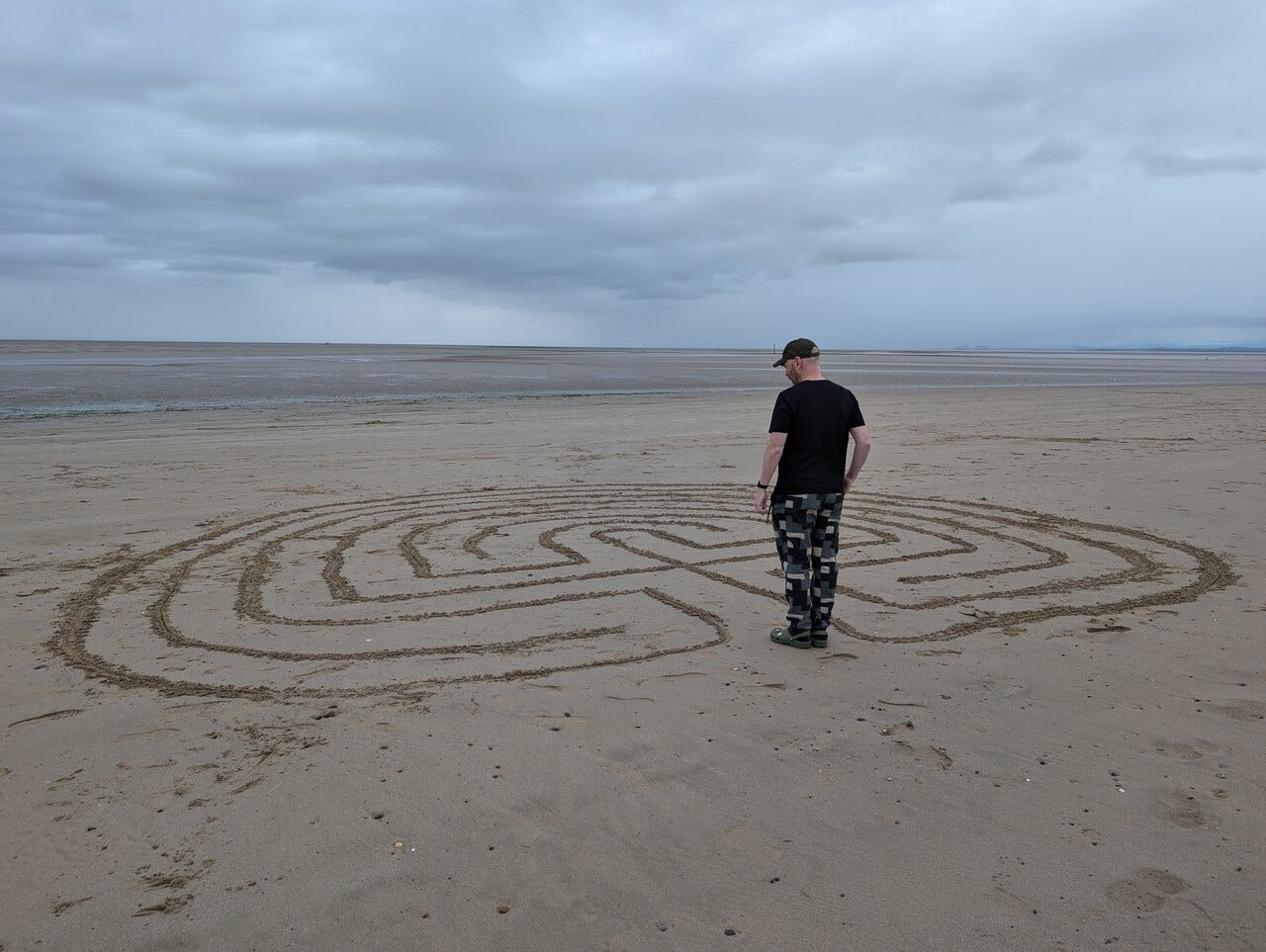Notifications, breaking news, task reminders, alarms, emails and questions. Every day, barely a second goes by without something shouting at me: “Pay attention!”
That's before I even get to the things I feel I ought to be doing. The quietest whispers of daily life, from eating meals to hugging friends, are drowned out in the cacophony of distractions. The onslaught of demands leaves my overwhelmed mind in a constant state of hyper-alert confusion.
Living in a society that tells me productivity is the only measurable good, it's no wonder I'm exhausted. I'm constantly playing catch up, sorting and resorting to-do lists, juggling responsibilities, trying to make sense of what's urgent and important. And often failing.
I need a break.
And I suspect I'm not alone. We've all lived too long in an always-on culture that tells us idle thoughts are a bad thing. A wandering mind is a danger that needs to be controlled, whether through structured planning, mindfulness or medication. Somehow, we've lost sight of the benefits of daydreaming.
We can let our minds wander free.
Mind wandering
Over the past few decades, researchers have become increasingly interested in the phenomenon of the wandering mind. What exactly are our brains doing when we're not focused on the task at hand?
I can see why this is an important question. If I'm on an operating table, I'd rather have a surgeon who is focused on keeping me alive than imagining their next golf game. I'd prefer it if air traffic controllers noticed before planes got too close to each other. And it would be better if we scrutinised politicians’ intentions before we elected them. When we stop paying attention, bad things can happen.
But all of life isn't so critically important. Why does it matter if we stare out of the window in a boring lecture? If we phase out for a little while in a long conversation? If we’re so lost in thought that we can't answer the question, “what are you thinking about?”
Mind wandering is what happens when we're not focused on a specific task and simply let our thoughts drift. Sometimes this happens unintentionally and the consequences can sometimes be harmful. But it's not always a bad thing.
Wandering and creativity
There is a long history of creative people who let their minds wander as they wandered.
Many philosophers thought best on their feet. In ancient Greece, Aristotle would walk as he taught, sharing ideas with his students in his peripatetics. In more recent times, Nietzsche hiked often, firmly believing that "all truly great thoughts are conceived by walking.” Authors like Dickens, Woolf and Hemingway walked to gather ideas and overcome writer's block. Beethoven’s Pastoral Symphony was directly inspired by the sounds of his countryside excursions. Turner captured the landscapes he explored in his luminous paintings.
But stimulating creativity isn't just for those of us engaged in artistic pursuits. Finding solutions to unresolved problems and dilemmas often requires seeing things from a different perspective, and the sideways shift of creative thinking can offer us a new approach.
Allowing our minds to wander lets our brains do the work of unconscious associative processing, finding connections between ideas and thoughts that our conscious minds struggle to grasp. Focused thinking obscures anything that's not in our field of vision; unfocused mind wandering gives us access to more remote ideas, weaving together a network of isolated thoughts into novel solutions.
Mind wandering can be good for our mood too. Taking a mental break from a monotonous activity instantly relieves boredom, and mind wandering can connect us with positive memories and future scenarios.
And it can help us learn. Coming back afresh to a once-familiar idea can enhance long-term memory. That's why regular breaks are essential, whether we’re studying for an exam or developing a new skill. Consciously re-remembering jolts our brains into considering again what they already know.
Most importantly, mind wandering helps make our lives meaningful. All our lives are made of a series of jumbled and disconnected events. Our wandering minds play a vital role in integrating past experiences and imagining our future, building a more coherent story. Wandering thoughts help us discover who we are becoming.
My wandering mind
If I want to give my mind space and time to wander, I've always found that it's good to take my thoughts for a walk.
There's a long, seaside path that leads from my home in Fleetwood towards the centre of Blackpool and it's perfect for long-distance thinking. Sometimes, it's simply that the changing environment and persistent rolling of the waves shift my perspective and spark new ideas. But the unconscious movement of walking frees up my capacity for wandering thoughts. With my body in motion, my mind is suddenly adrift in the world. Carried on the steady cadence of my footsteps, my stagnant mind begins to flow.
Whenever I'm stuck on a problem, I talk to myself as I walk. Rather than try and silence all the competing priorities that cloud my thinking, I give them space in the open air. An uninformed observer watching me walk would see someone ranting and arguing with invisible others as they plod along. But I often need to talk myself to the point of exhaustion. Eventually my ideas have nothing to say for themselves, and I'm left with the simplicity of my steps.
Released from the confines of stationary concentration and stale views, my body settles into a different way of being in the world. Lungfuls of fresh air push oxygenated blood to my depleted brain. Fragmented ideas can take new forms. Sometimes, the silence of walking is all I really need. But there's always the possibility that inspiration could strike with every footstep. There's something in the steady rhythm of a familiar path that can let my thinking roam free.
Physical exhaustion is a slow-burn route to enlightenment. But often, the only answer to life’s problems is a long walk.
Walking for thinking
I'll admit that walking until my feet hurt might be an extreme approach to discovering a new way of thinking. But I believe even a short walk around the block can be beneficial. The value of mind wandering during a walk lies in the quality of thought and the shifts in perspective it allows, rather than the duration or intensity of the walk itself. Ultimately, it’s moments not miles that matter most.
If you're stuck, blocked or seeking inspiration, here are some ideas to let your mind wander as you walk:
Embrace the paradox of intention. While goals presume that you already know the answers, intentions encourage you to love the questions themselves. So, setting out with the goal of finding an answer immediately boxes you into the corner of what you already know. Start walking instead with an intention to understand the problem better, and fresh insights may meet you on the trail.
Approach walking as a thinking tool. Whether you're walking alone or with others, wandering is an ideal setting for rambling conversation. Don't be afraid of retreading old ground. As you allow your thoughts to drift with your body along the path, new ideas can emerge. Fresh solutions may be waiting in your footsteps.
Schedule walking breaks. If, like me, your working life is often spent at a desk, give yourself time to wander during the working day. Leave your phone and other distractions at home. Don't concentrate too hard on carrying a problem with you. Just walk, and trust your brain to do the rest.
Step into the simplicity of the labyrinth. Unlike mazes, labyrinths don’t require you to make choices about which way to turn, so their single path offers freedom for your mind to wander as your body moves. Your only task is to journey to the centre and return along the path you walked. Find a labyrinth near you.
Seek answers in nature. The earth is alive with the wisdom of alternative perspectives if you are willing to pay attention. What can oak, river and magpie teach you? Approach the more-than-human community with curiosity, and let it show you another way. There is magic to be found in your wonder at the living world.
Give yourself a break from remembering. I'm a passionate advocate for journaling, but hungrily capturing every passing thought can weigh you down in the detail of what you already know. You are not allotted a life quota of creative ideas that you can somehow exhaust. It's OK to let thoughts come and go. In fact, holding on less tightly to inspiration can create space for fresh insights to emerge.
Let go of the urgency of seeking a eureka moment as you walk. Wandering is an embodied reminder that there is more to life than the problem you're trying to solve. There's always something more interesting around the corner, even if it's only the silence of realising there are no answers at all.
Wandering into wonder
Much like wandering footsteps that make a new trail, the path of a wandering mind can lead to moments of encounter, insight and transformation. Allowing our thoughts to wander freely can lead to fertile ground where creativity blooms and solutions take shape. The path invites us into a gentler world that is a balm for the soul. And just as a well-worn path carries the stories of those who have journeyed it, so our wandering thoughts can knit together the often-disparate moments of our lives into more meaningful stories.
The kinship between our inner meandering and the simple act of walking is a thread worth following. The rhythm of our bodies and the ever-shifting sights that greet our gaze can bring us to a magical place where our thoughts are emboldened to drift and connect in ways our focused minds might never imagine. We only need to set out with a simple intention to observe and to learn. We place our feet on the path and trust wherever it might lead us.
A mind allowed to wander, unburdened by the immediate demands of everyday life, is often the most receptive to the subtle wonders that brush against our existence. The unexpected flash of colour, a fleeting melody carried on the breeze, a half-formed idea that suddenly clarifies; these are the sparks of inspiration that a tightly focused mind might miss. There is wonder in a life lived in harmony with the enchantment of a wandering mind.
So, become lost in your thoughts. Relish the quiet wisdom of a mind that's free to roam. Beyond the edges of your mental map, there are unexpected treasures and extraordinary discoveries nestled in the ordinary moments of each day.
Step out, breathe deep and allow your mind to go where it will. You may be surprised by the gifts it brings back to you.










